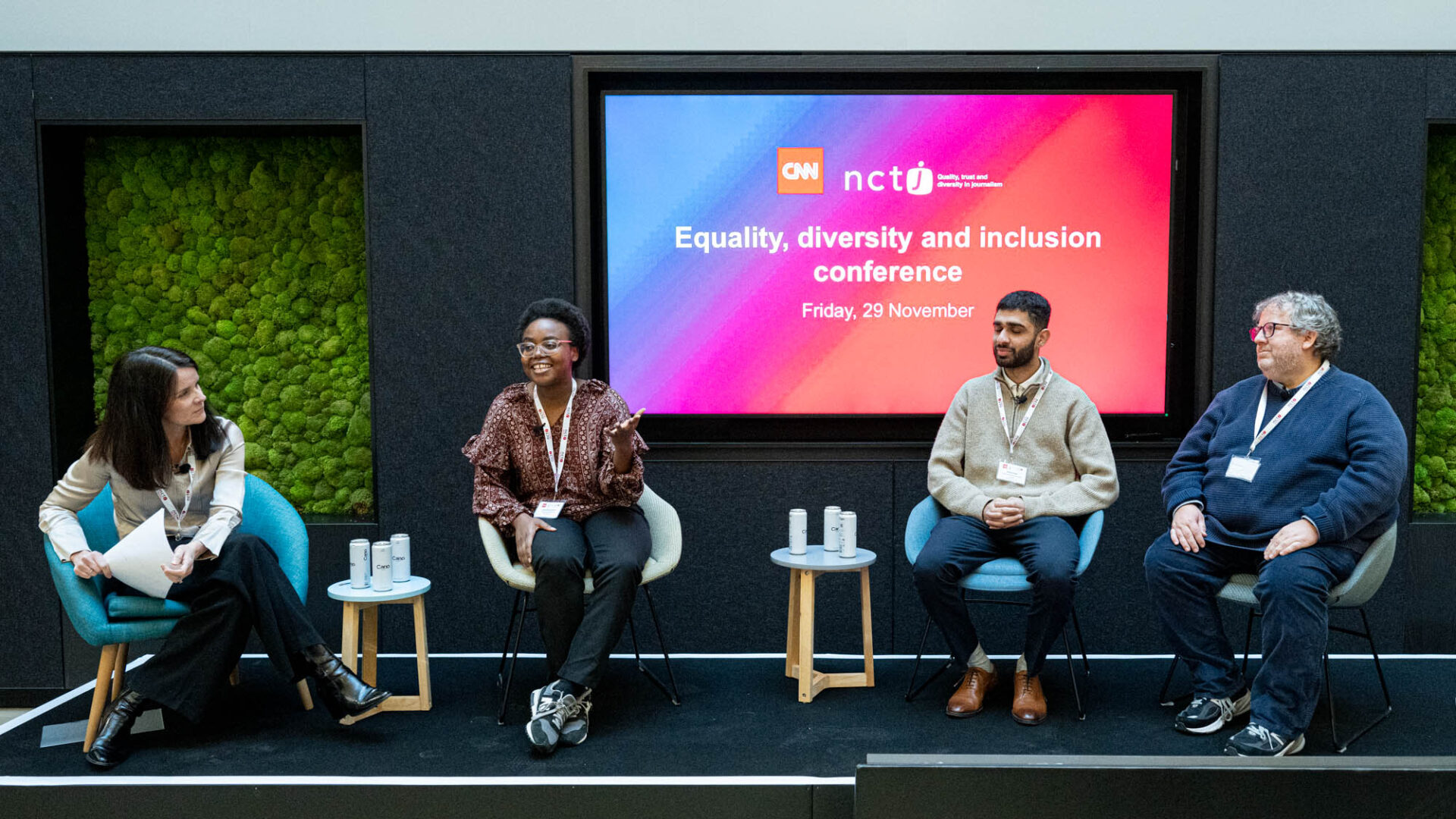
Industry leaders, students and educators gather for NCTJ equality, diversity and inclusion conference
Journalists, students, trainers, and media representatives from across the UK gathered today in London for the NCTJ’s equality, diversity and inclusion conference, in partnership with CNN.
Journalists, students, trainers, and media representatives from across the UK gathered today in London for the NCTJ’s equality, diversity and inclusion conference, in partnership with CNN.
The event explored how the industry can build on efforts to improve diversity and inclusion while celebrating recipients of the NCTJ’s Journalism Diversity Fund (JDF).
The JDF supports aspiring journalists from diverse backgrounds by providing financial assistance for their NCTJ training.
NCTJ chief executive Joanne Forbes set the tone for the day in her opening remarks. She said: “It’s important for events like this to celebrate success, and to have a constructive discussion about the issues and how we can best make a difference.”
The first panel, chaired by Veronica Kan Dapaah, assistant editor at the Financial Times, focused on employability, networking, and the power of mentoring.
Panellists included Nada Bashir, international correspondent, CNN, Japtej Ghura, former JDF recipient and football reporter, Hayters TV, Aidan McCartney, senior sport editor, Reach, and Rebecca Moore, senior director of bureau & technical operations, CNN.
Speaking of the importance of mentors and role models, Japtej said: “Not seeing people like me on the TV is a driver to be that person for younger people to look up to. Since I have been on this journey with my career, a lot of people have reached out to me to say what I am doing has really inspired them.
“It is such a lift and in 15 or 20 years time, I hope I can be a mentor to support others. The more people you see doing what you want to do, it reminds you that you can do it.”
A second session, led by Schams Elwazer, director of news video at CNN International, tackled overcoming anxiety and gaining confidence in journalism. Panellists Lisa Bradley, deputy head of journalism studies, University of Sheffield, and Connor Parker, freelance journalist and former JDF recipient, spoke candidly about mental health challenges and strategies for resilience.
Connor shared: “Imposter syndrome has been crushing for me and it never really goes away. For me, it helped when I realised a lot of other people also feel the same. I would look at them, and they’re brilliant at what they do, and so it did make me feel a bit better.”
Lisa said: “Generation Z are the most anxious generation and are susceptible to vicarious (secondary) trauma.
“But we also have a young generation who feel more comfortable talking about their feelings, their anxiety and their stress.”
The conference also addressed generational diversity in the newsroom, with Jo Webster, global managing editor for visuals at Reuters, moderating a discussion featuring Todd Baxter, senior director, newsgathering video production, CNN, Aadam Patel, sports journalist, Daily Mail, and Camomile Shumba, UK regulatory reporter, CoinDesk.
The panel explored how differing perspectives enrich storytelling and newsroom culture.
Speaking about integrating into the Daily Mail newsroom, Aadam Patel, said: “You need to show respect for senior management and at the same time you need to show you have something about you and take risks.”
Talking about the emphasis on work-life balance, Camomile Shumba said: “When I started, I put myself under pressure to work hard, feel stressed and anxious. Then I realised you need to have a life. I work hard within the hours that I have. Others also benefit – it’s not just for you but for your editor. That is the way I approach it, and it has given me peace.
A highlight of the event was the presentation of four specialist bursaries to JDF recipients. Layla Laidouci and Nadia Sayed received the Aziz Foundation bursary, Carly Lyes was awarded the Football Writers’ Association bursary, and Gareth Hamill was this year’s recipient of the Thomas Read bursary.
Jamie Read, presenting the Thomas Read bursary, said: “There is still a lot of work to do around diversity. People see disability and we will continue to support those living with long-term health conditions and disabilities.”
Paralympic champion and broadcaster Ellie Simmonds took part in an inspiring conversation with Sanny Rudravajhala, freelance journalist and former JDF recipient.
Reflecting on her career and the importance of inclusive storytelling, Ellie said: “I remember when I first saw the Paralympic Games in Athens in 2004 and thought, there were people like me on TV, there is Paralympic sport, and how do I get into that? If I hadn’t sat down then on the sofa and watched the games that day, I would never be where I am today. It changed my life and if I can help change someone else’s life for the positive, I’d be happy.
“Representation is so important, not tick-boxing but making sure disabled individuals are visible and not just every four years. There needs to be coverage in a natural way on TV – not just in front of the camera but behind the scenes.”
The day concluded with NCTJ chair Sue Brooks receiving a cheque for £100,000 from Neil O’Brien, commercial director at NLA media access, lead sponsor of the JDF.
Sue closed the conference by emphasising the NCTJ’s commitment to fostering a diverse future for journalism.
She also offered a word of advice for the young journalists in the audience, saying: “Imposter syndrome never goes away. All you can do is learn to live with it – embrace your inner imposter. It is always there and is part of being alive. It helps to acknowledge and talk about it.”
For more information about the Journalism Diversity Fund, click here.

